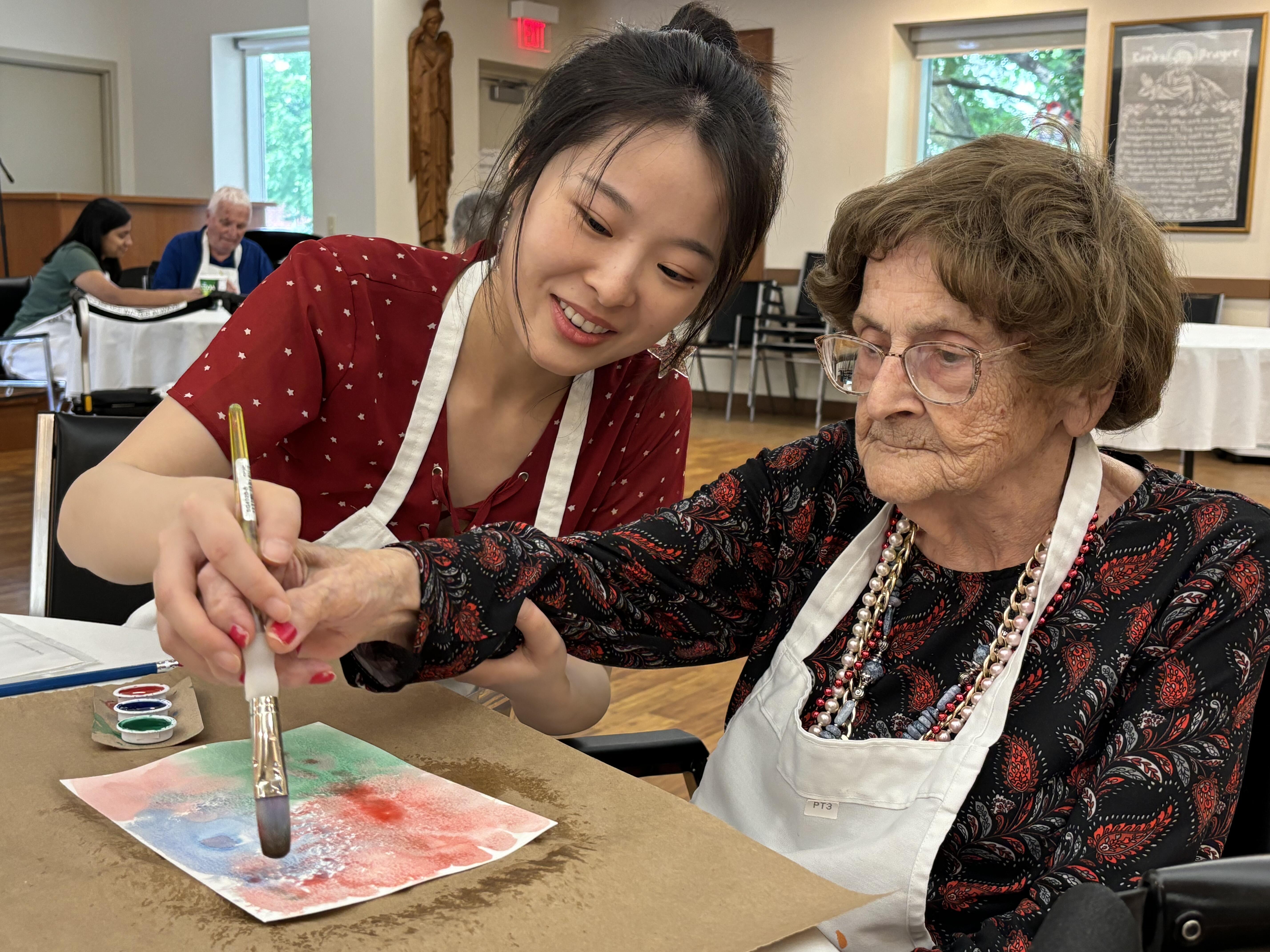Conestoga students are volunteering with people living with dementia at a Kitchener long-term care home, guiding them through art sessions designed to foster meaningful connections and a sense of belonging between the students and seniors.

Conestoga student Xiao Xiao creates art with a resident of Trinity Village Care Centre in Kitchener. The program connects students and seniors living with dementia and every week they gather to make art and chat, guided by step-by-step instructions and tips to spark conversation around the activity.
The students eagerly responded to the Centre for Health Care Research & Innovation’s open call for volunteers to participate in the Building Intergenerational Connections between Seniors and Students program at Trinity Village Care Centre in Kitchener.
The initiative was initially funded through the Schlegel-UW Research Institute for Aging Foundation’s Supporting Inclusion through Intergenerational Partnerships Program and has been sustained through funding provided by the Government of Canada’s New Horizons for Seniors Program (NHSP).
The students were matched with a resident who lives with dementia and, after virtual and in-person orientation sessions, they began weekly visits structured around Opening Minds through Art (OMA), an evidence-based art-making program developed at a Scripps Gerontology Center, Miami University in Ohio.
“It’s been a wonderful initiative,” said Linda Sheiban Taucar, the centre’s director.
The visits give the students an opportunity to learn about dementia and how to communicate with someone who has the condition that affects memory and thinking. Abstract art is the avenue for participants to connect with each other and also the world, wrapping up the sessions with a celebratory art show of the creations.
Sessions start with the students gathering around a table as the activity is demonstrated by a nursing home employee who supports the program. Each gets a laminated piece of paper with step-by-step instructions for that day’s art and, on the backside, tips to spark conversations around the activity.
That first session, students are nervous and unsure. “At the end, you can see a huge transformation,” said Fateema Kassam, registered nurse and training specialist at the Centre for Health Care Research & Innovation. “They look forward to it every week.”
Interacting with someone who has dementia requires adaptability because things don’t always go as planned, but the experience teaches invaluable life and communication skills.
“I teach the students that if you can talk to a person with dementia, you can talk with anyone,” said Kathryn Bender, recreationist in Trinity’s secure dementia unit and OMA lead.
Supplies for each step are placed next to the seniors as the students offer choices of paint colour, ephemera, glitter and other bits to create their underwater scene with the final step of naming their masterpiece.
The pairs talked quietly together as they worked through a “deep sea watercolour” at a recent session. Students guided the seniors through each step, using gentle prompts or a soft touch when needed to help them along.
“It’s a great bunch of students,” Bender said.
The final exhibition includes reading letters the students write to the resident they were paired with and their families, sharing their reflections on the experience.
Student participant Adachioma Ihueze appreciates seeing how much the residents enjoy the art sessions, starting out hesitant but quickly being more social with each other and chatting with their partner about the art they’re creating together.
“Residents encourage each other and look forward to catching up. Creatively, we are seeing many open up more.”
Ihueze and her partner Catherine experimented with a wide variety of mediums to create detailed paintings, inspiring others in the group. Ihueze soon learned that it was important to allow time for reminiscing because sharing stories related to the art seems just as important to residents as the creative process.
“I'm learning to better pace our activities to encourage this meaningful social interaction,” Ihueze said.
“Challenges include keeping the needs of residents at different cognitive levels in mind. Simple, clear instructions paired with one-on-one guidance is important so all can participate meaningfully.”
Student Xiao Xiao called it a “very meaningful and unforgettable experience.”
“These elderly people are very lovable and kind. They may have some hearing issues, speech difficulties, or slower reactions. However, they are very thoughtful and creative, and they express care and affection towards us,” Xiao said. “Participating in this project made me deeply realize that by coming to them, I am not just helping them; they are also healing me.”
The Centre for Health Care Research & Innovation focuses on strengthening the health-care system with collaborative, community focused research through partnerships with industry, researchers and faculty, and students.
